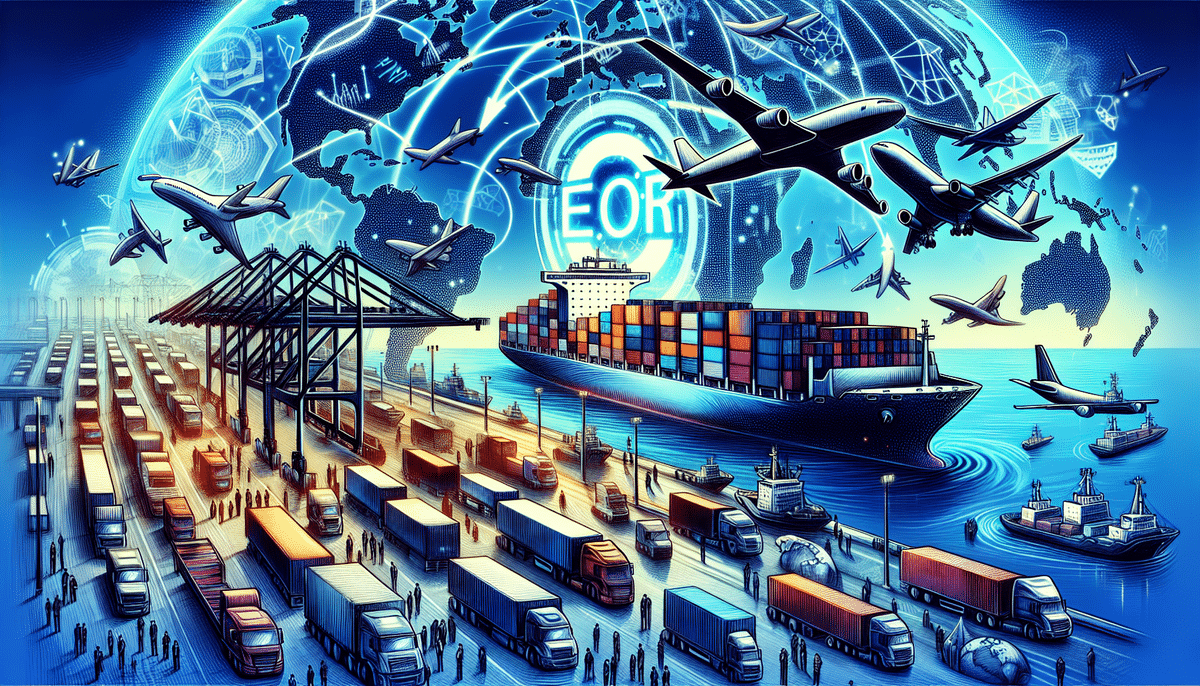Understanding EORI (Economic Operator Registration and Identification)
If you're involved in international trade, you may have heard of EORI—the Economic Operator Registration and Identification number. In this article, we'll explore what EORI is, why it's important, how to apply for it, and much more. By the end of this article, you'll have a thorough understanding of EORI and its role in international trade.
What is EORI and Why is it Important?
EORI is a unique registration and identification number assigned to businesses engaged in importing and exporting goods. It serves as a customs registration number that identifies your business to customs authorities, simplifying customs procedures and enhancing security in international trade.
Having an EORI number is crucial because it's a legal requirement in most countries for businesses to trade internationally. It allows customs authorities to identify who is responsible for the goods being imported or exported, ensuring that proper customs procedures are followed. Without an EORI number, your goods may be delayed or even seized by customs authorities.
It's important to note that EORI numbers are not limited to businesses that directly import or export goods. If your business is part of the supply chain, such as providing logistics or transportation services, or acting as an intermediary between buyers and sellers, you may also need an EORI number.
The History of EORI and Its Evolution Over Time
The concept of EORI was first introduced by the European Union (EU) in 2006 as part of the modernization of the customs code. The aim was to streamline customs procedures and improve security by assigning a unique identification number to businesses involved in international trade. Since then, many countries worldwide have adopted similar systems, each with its own unique identifier for businesses.
In 2009, the EU mandated that all businesses engaged in international trade obtain an EORI number. This regulation significantly streamlined customs procedures and reduced the risk of fraud and security breaches.
In recent years, the EORI system has been integrated with other customs systems, such as the United States' Automated Export System (AES). This integration has further improved the efficiency and accuracy of customs procedures, facilitating easier compliance for businesses engaged in international trade.
For more detailed information, refer to the official EU [EORI regulations](https://ec.europa.eu/taxation_customs/business/customs-procedures/customs-procedures-movement-goods/eori_en).
Difference Between EORI and Other Registration Numbers
EORI is distinct from other business registration numbers such as Value-Added Tax (VAT) numbers or Tax Identification Numbers (TIN). While VAT and TIN are essential for domestic taxation and reporting, an EORI number is specifically designed for identifying businesses involved in imports and exports to customs authorities.
Additionally, EORI numbers are required for businesses that trade goods with countries outside the European Union (EU). If your business only trades within the EU, you might not need an EORI number. However, if you plan to expand your business internationally, obtaining an EORI number in advance is advisable to prevent delays or issues with customs clearance.
Who Needs an EORI Number and How to Apply for One
Any business involved in international trade, whether importing or exporting goods, requires an EORI number. This includes businesses trading within the EU and those dealing with countries outside the EU. If your business operates from multiple locations involved in international trade, each location will need its own EORI number.
Applying for an EORI number is generally straightforward. Most countries allow online applications through their customs authority's website. The application process typically involves submitting information about your business, such as legal name, address, and tax registration number. Once approved, you'll receive your EORI number.
Having an EORI number not only complies with legal requirements but also streamlines the customs clearance process, reducing the risk of delays or seizures by customs officials. Moreover, it grants access to certain customs procedures like customs warehousing and inward processing.
It's essential to stay updated with any changes to EORI regulations. For instance, following Brexit, UK businesses need to apply for a separate UK EORI number when trading with the EU. Regularly consult your customs authority to ensure compliance with all relevant regulations.
For detailed application procedures, visit the [EU Customs EORI application page](https://ec.europa.eu/taxation_customs/business/customs-procedures/customs-procedures-movement-goods/eori_en).
How to Verify the Validity of an EORI Number
Ensuring the validity of EORI numbers you receive from other businesses is crucial. You can verify an EORI number by using the [EU's VIES system](https://ec.europa.eu/taxation_customs/vies/) or the respective customs authority's online database to check the number's status and confirm it belongs to the correct business.
Alternatively, you can contact the customs authority directly for verification. This is particularly useful when dealing with new suppliers or if you have doubts about the legitimacy of a business.
Maintaining your own EORI number's validity is equally important. If your business details change—such as address or legal entity—you must update your EORI number accordingly. Failure to do so can result in customs delays or operational issues.
The Benefits of Having an EORI Number for Businesses Engaged in International Trade
Possessing an EORI number offers several advantages for businesses involved in international trade:
- Simplified Customs Procedures: Speeds up the import/export process by reducing paperwork and streamlining interactions with customs authorities.
- Regulatory Compliance: Ensures your business adheres to necessary customs regulations, minimizing the risk of delays or penalties.
- Enhanced Reputation: Demonstrates legitimacy and professionalism, building trust with customers, suppliers, and partners.
- Access to Customs Facilities: Enables participation in customs warehousing, inward processing, and other customs procedures that can reduce costs and increase efficiency.
- Eligibility for Trade Agreements: Facilitates access to preferential tariffs and trade agreements, expanding market opportunities.
According to the ShipScience International Trade Report 2023, businesses with an EORI number experience a 15% reduction in customs processing times and a 10% decrease in associated costs.
The Impact of Brexit on EORI Numbers for UK Businesses
With the UK's exit from the EU, there have been significant changes to EORI numbers for UK businesses trading with the EU. UK businesses are now required to have two separate EORI numbers:
- EU EORI Number: For trading with EU countries.
- UK EORI Number: For trading with non-EU countries.
Businesses that registered for an EORI number before Brexit must ensure they have both numbers to avoid complications with customs authorities. Failure to obtain the necessary EORI numbers can lead to delays or seizures of goods.
For more information, refer to the [UK Government's guidance on EORI numbers post-Brexit](https://www.gov.uk/eori).
Common Mistakes to Avoid When Applying for an EORI Number
When applying for an EORI number, avoiding common pitfalls can expedite the process and ensure compliance:
- Incomplete Information: Ensure all required details—such as legal name, address, and tax registration number—are accurately provided.
- Incorrect EORI Type: Different business structures (e.g., sole trader vs. limited company) require different types of EORI numbers.
- Outdated Information: Keep your EORI information current. Notify customs authorities of any changes to your business, such as address or legal name changes.
- Ignoring Regulatory Updates: Stay informed about changes in EORI regulations to maintain compliance.
How to Keep Your EORI Information Up-to-Date and Compliant with Regulations
Maintaining up-to-date EORI information is essential for compliance and smooth international trade operations:
- Regularly Update Contact Information: Ensure your business's address, phone number, and email are current.
- Notify Customs Authorities of Changes: Immediately report any changes to your business structure, legal name, or other critical information.
- Comply with Licensing and Permits: Ensure you have the necessary licenses and permits for the goods you import or export.
- Monitor Regulatory Changes: Stay informed about updates to customs regulations that may affect your EORI requirements.
For guidance on maintaining compliance, visit the [EU Customs EORI information page](https://ec.europa.eu/taxation_customs/business/customs-procedures/customs-procedures-movement-goods/eori_en).
Frequently Asked Questions About EORI Numbers Answered
Here are some answers to frequently asked questions about EORI numbers:
- What happens if I don't have an EORI number?
Your goods may be delayed or even seized by customs authorities. - Do I need a separate EORI number for each country I trade with?
In most cases, no. A single EORI number suffices within the EU, but some countries outside the EU may require their own identification systems. - How long does it take to get an EORI number?
The processing time varies by country, typically ranging from a few days to a few weeks after application. - Do I need to renew my EORI number?
No. Your EORI number remains valid as long as your business is engaged in international trade, provided your information remains current.
Top Tips for Using Your EORI Number Effectively
Maximize the benefits of your EORI number with these top tips:
- Include Your EORI Number on All Customs Declarations and Invoices: This ensures smooth processing and compliance.
- Keep EORI Information Updated: Promptly update any changes to avoid customs delays.
- Verify EORI Numbers: Always check the validity of EORI numbers received from other businesses to prevent fraud.
- Separate EORI Numbers for UK and EU Trade: If you're a UK business, maintain distinct EORI numbers for trading with the EU and non-EU countries.
Understanding the Role of Customs Authorities in Regulating International Trade
Customs authorities are pivotal in regulating international trade by ensuring that all goods are properly declared and comply with necessary regulations and procedures. They utilize EORI numbers to identify businesses involved in international trade, facilitating the enforcement of customs laws and the efficient processing of goods.
Compliance with customs regulations is essential to avoid legal issues, fines, and disruptions in your supply chain. Businesses engaged in international trade should familiarize themselves with the customs requirements of the countries they operate in and ensure adherence to all relevant laws and procedures.
For more information on customs regulations, visit the [World Customs Organization](https://www.wcoomd.org/).






















